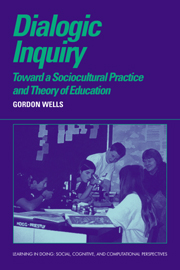Book contents
- Frontmatter
- Contents
- Conventions of Transcription
- Introduction
- Part I Establishing the Theoretical Framework
- Part II Discourse, Learning, and Teaching
- 4 Text, Talk, and Inquiry: Schooling As Semiotic Apprenticeship
- 5 Putting a Tool to Different Uses: A Reevaluation of the IRF Sequence
- 6 From Guessing to Predicting: Progressive Discourse in the Learning and Teaching of Science
- 7 Using the Tool-kit of Discourse in the Activity of Learning and Teaching
- 8 Making Meaning with Text: A Genetic Approach to the Mediating Role of Writing
- Part III Learning and Teaching in the zpd
- Appendix I A Social Constructivist Model of Learning and Teaching
- Appendix II Categories for the Analysis of Discourse
- References
- Index of Authors
- Index of Subjects
- Title in the series
6 - From Guessing to Predicting: Progressive Discourse in the Learning and Teaching of Science
Published online by Cambridge University Press: 09 November 2009
- Frontmatter
- Contents
- Conventions of Transcription
- Introduction
- Part I Establishing the Theoretical Framework
- Part II Discourse, Learning, and Teaching
- 4 Text, Talk, and Inquiry: Schooling As Semiotic Apprenticeship
- 5 Putting a Tool to Different Uses: A Reevaluation of the IRF Sequence
- 6 From Guessing to Predicting: Progressive Discourse in the Learning and Teaching of Science
- 7 Using the Tool-kit of Discourse in the Activity of Learning and Teaching
- 8 Making Meaning with Text: A Genetic Approach to the Mediating Role of Writing
- Part III Learning and Teaching in the zpd
- Appendix I A Social Constructivist Model of Learning and Teaching
- Appendix II Categories for the Analysis of Discourse
- References
- Index of Authors
- Index of Subjects
- Title in the series
Summary
In the preceding chapter, I argued that triadic dialogue is not necessarily incompatible with a mode of classroom interaction in which students play a part in proposing topics for discussion. The next question to be addressed is whether such collaborative discussion can become progressive; that is to say, can students contribute in such a way that they build on their peers' earlier contributions in a manner that advances the collective understanding of the topic under discussion?
The two episodes to be discussed in this chapter are taken from a curricular unit on mass which took place in the same classroom early in the following school year. Several of the children have continued with the same teacher into what is now a Grade 4/5 class and, as will be seen, a collaborative community of inquiry is becoming quite well established.
The Importance of Predicting When Carrying Out an Experiment
The first activity occurred in the second lesson in this curricular unit and was part of a series devoted to answering the question: “Does mass change when matter changes state?” In the previous lesson, the class had carried out a number of teacher-planned experiments, which involved massing the relevant materials before and after the change of state (e.g. melting a block of ice, dissolving sugar cubes in water) in order to discover whether there had been any change in mass. Today's lesson is going to be devoted to continuing the experiments, with attention to the procedures necessary to ensure that the experiments are fair tests.
- Type
- Chapter
- Information
- Dialogic InquiryTowards a Socio-cultural Practice and Theory of Education, pp. 209 - 230Publisher: Cambridge University PressPrint publication year: 1999



